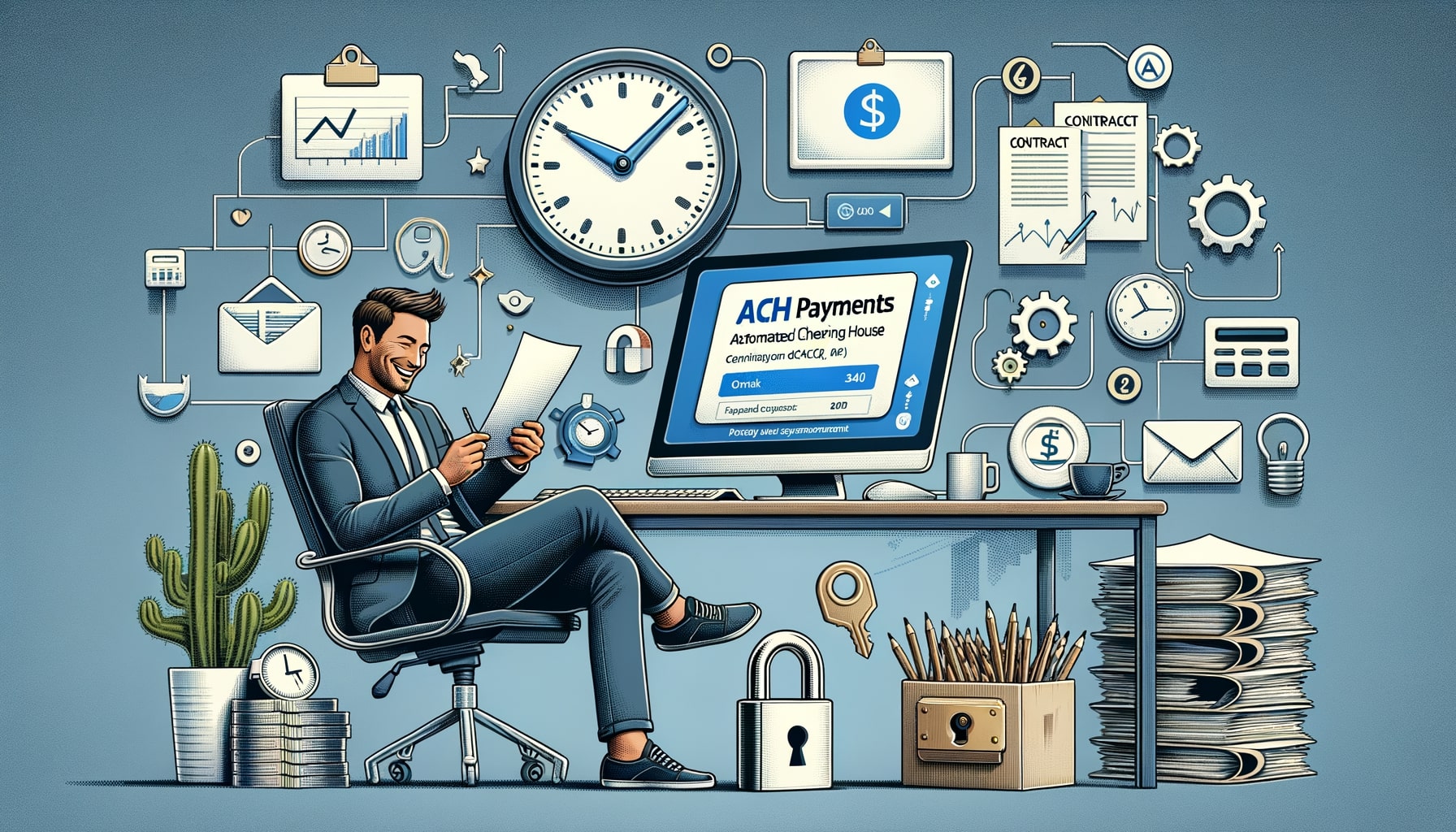
By alphacardprocess October 18, 2024
In today’s digital age, electronic payment methods have become increasingly popular and widely adopted across various industries. One such method is Automated Clearing House (ACH) payments, which offer numerous benefits for contractors. ACH payments provide a secure, efficient, and cost-effective way for contractors to receive payments from clients and manage their cash flow effectively.
In this comprehensive guide, we will explore the various advantages of ACH payments for contractors, including streamlined payment processes, enhanced security and fraud protection, cost savings, improved cash flow management, simplified payment processes, convenience, and the potential for increased business opportunities.
How ACH Payments Streamline Contractor Payments
One of the primary benefits of ACH payments for contractors is the streamlined payment process it offers. Traditionally, contractors had to deal with time-consuming and cumbersome payment methods, such as paper checks or manual bank transfers. These methods often involved manual data entry, physical transportation of checks, and delays in receiving funds. However, with Automated Clearing House (ACH) payments, contractors can receive payments directly into their bank accounts electronically, eliminating the need for physical checks and reducing administrative tasks.
ACH payments streamline the payment process by automating the transfer of funds between the contractor’s client and their bank account. This automation eliminates the need for manual intervention, reducing the chances of errors and delays. Contractors can set up recurring payments or receive one-time payments, depending on their agreement with the client. This flexibility allows contractors to focus on their core business activities, rather than spending valuable time on payment-related tasks.
Enhanced Security and Fraud Protection with ACH Payments

Security and fraud protection are crucial considerations for any contractor when it comes to receiving payments. Automated Clearing House (ACH) payments offer enhanced security measures compared to traditional payment methods, such as paper checks. With ACH payments, contractors can reduce the risk of check fraud, identity theft, and unauthorized access to their bank accounts.
Automated Clearing House (ACH) payments utilize encryption and secure networks to transmit payment information securely. This encryption ensures that sensitive data, such as bank account numbers and personal information, remains protected from unauthorized access. Additionally, ACH payments require authentication and verification processes, such as two-factor authentication, to ensure that only authorized individuals can initiate and receive payments.
Furthermore, Automated Clearing House (ACH) payments provide contractors with detailed transaction information, including the originator’s name, date, and amount of the payment. This information allows contractors to reconcile their accounts easily and identify any discrepancies or fraudulent activities. In case of any suspicious transactions, contractors can quickly notify their bank and take appropriate actions to mitigate potential losses.
Cost Savings and Efficiency Gains for Contractors

Cost savings and efficiency gains are significant advantages of ACH payments for contractors. Traditional payment methods, such as paper checks, often incur additional costs, including printing, postage, and bank fees. These costs can quickly add up, especially for contractors who receive numerous payments regularly.
ACH payments eliminate many of these costs associated with traditional payment methods. Contractors can save on printing and postage expenses, as Automated Clearing House (ACH) payments are entirely electronic. Additionally, Automated Clearing House (ACH) payments typically have lower transaction fees compared to other payment methods, such as wire transfers. This cost-saving aspect of ACH payments allows contractors to allocate their financial resources more efficiently and invest in other areas of their business.
Moreover, ACH payments offer efficiency gains for contractors by reducing the time and effort required for payment processing. Contractors no longer need to manually deposit checks or visit banks to initiate transfers. Instead, Automated Clearing House (ACH) payments automate these processes, allowing contractors to receive funds directly into their bank accounts. This automation saves valuable time and resources, enabling contractors to focus on their projects and deliverables.
Improved Cash Flow Management with Automated Clearing House (ACH) Payments

Cash flow management is crucial for contractors to ensure the smooth operation of their business. Automated Clearing House (ACH) payments provide contractors with improved cash flow management capabilities, allowing them to have better control over their finances. Contractors can receive payments faster and more predictably, enabling them to plan and allocate their resources effectively.
With ACH payments, contractors can receive funds directly into their bank accounts within a specified timeframe. This direct deposit eliminates the need for manual check deposits and reduces the time it takes for funds to become available. Contractors can access their funds quickly, enabling them to pay their suppliers, subcontractors, and employees promptly.
Furthermore, Automated Clearing House (ACH) payments offer contractors the option to set up recurring payments. This feature is particularly beneficial for contractors who have ongoing projects or long-term contracts with clients. Contractors can schedule recurring payments, ensuring a steady cash flow and reducing the administrative burden of initiating payments manually.
Simplified Payment Processes for Contractors

ACH payments simplify the payment processes for contractors, making it easier for them to receive and manage payments. Contractors no longer need to handle physical checks, visit banks, or manually initiate transfers. Instead, Automated Clearing House (ACH) payments automate these processes, providing contractors with a seamless and efficient payment experience.
To receive ACH payments, contractors need to provide their clients with their bank account information, such as the routing number and account number. Once the client has this information, they can initiate payments directly from their bank account to the contractor’s bank account. This direct transfer eliminates the need for intermediaries and reduces the chances of errors or delays.
Additionally, Automated Clearing House (ACH) payments provide contractors with detailed payment information, including the client’s name, payment date, and amount. This information is essential for contractors to reconcile their accounts and track their payments accurately. Contractors can easily match the payment information with their invoices or project records, ensuring that all payments are accounted for.
ACH Payments and the Convenience Factor for Contractors
Convenience is a significant advantage of ACH payments for contractors. Automated Clearing House (ACH) payments offer a convenient and hassle-free way for contractors to receive payments from clients. Contractors no longer need to wait for physical checks to arrive in the mail or visit banks to deposit checks. Instead, they can receive payments directly into their bank accounts, saving time and effort.
Furthermore, ACH payments provide contractors with the convenience of accessing their funds electronically. Contractors can easily transfer funds from their bank accounts to pay their suppliers, subcontractors, or employees. This electronic transfer eliminates the need for physical cash or checks, making the payment process more efficient and secure.
ACH payments also offer convenience for contractors in terms of payment tracking and record-keeping. Contractors can easily access their payment history and transaction details through their online banking platforms. This accessibility allows contractors to monitor their payments, reconcile their accounts, and generate reports for accounting and tax purposes.
ACH Payments and the Potential for Increased Business Opportunities
ACH payments have the potential to open up new business opportunities for contractors. By offering ACH payment options to clients, contractors can attract more clients and differentiate themselves from competitors. Many clients prefer electronic payment methods, as they offer convenience, security, and efficiency.
Contractors who accept ACH payments can position themselves as modern and technologically advanced, appealing to clients who value these qualities. By providing clients with the option to pay via ACH, contractors can streamline the payment process and enhance the overall client experience. This positive experience can lead to increased client satisfaction and potentially result in repeat business or referrals.
Furthermore, Automated Clearing House (ACH) payments can enable contractors to expand their business beyond their local market. With electronic payment capabilities, contractors can work with clients from different geographical locations, without the limitations of physical checks or manual transfers. This expanded market reach can open up new business opportunities and increase the contractor’s revenue potential.
FAQs
Q1: How long does it take for Automated Clearing House (ACH) payments to process?
Automated Clearing House (ACH) payments generally take 1-3 business days to process. However, many payment processors now offer same-day ACH options for faster access to funds.
Q2: Are ACH payments secure for contractors?
Yes, ACH payments are secure and processed through a regulated network with strong encryption protocols, reducing the risk of fraud compared to checks or cash.
Q3: Can ACH payments be used for large transactions?
Yes, Automated Clearing House (ACH) payments are often used for large transactions due to their cost-effectiveness and security. They are ideal for contractors who need to process significant payments to subcontractors, suppliers, or clients without incurring the high fees associated with credit cards or wire transfers.
Q4: What are the typical fees for ACH payments?
Fees for Automated Clearing House (ACH) payments are generally much lower than those for credit card payments or wire transfers. ACH transaction fees range from a few cents to a few dollars, depending on the payment processor and the nature of the transaction.
Q5: Can ACH payments be set up for recurring billing?
Yes, one of the biggest advantages of ACH payments is the ability to set up recurring payments. This is particularly useful for contractors who have ongoing projects or long-term service agreements, as it ensures timely and consistent payments without the need for manual invoicing.
Q6: What do contractors need to start accepting ACH payments?
Contractors need to partner with a payment processor or financial institution that supports ACH transactions. They will also need client authorization for ACH debits and may need to integrate ACH functionality into their invoicing or accounting software for automation.
Q7: Are Automated Clearing House (ACH) payments subject to fraud?
While Automated Clearing House (ACH) payments are generally secure, they are not completely immune to fraud. However, the risk of fraud is significantly lower than with paper checks or cash payments. Contractors can further reduce the risk by working with a secure payment processor and following best practices for client authorization.
Conclusion
ACH payments offer numerous benefits for contractors, ranging from streamlined payment processes to enhanced security and fraud protection. Contractors can enjoy cost savings, improved cash flow management, and simplified payment processes by adopting ACH payments. Additionally, Automated Clearing House (ACH) payments provide convenience and the potential for increased business opportunities for contractors.
By leveraging the advantages of Automated Clearing House (ACH) payments, contractors can optimize their payment operations, enhance client satisfaction, and position themselves for success in the digital era.